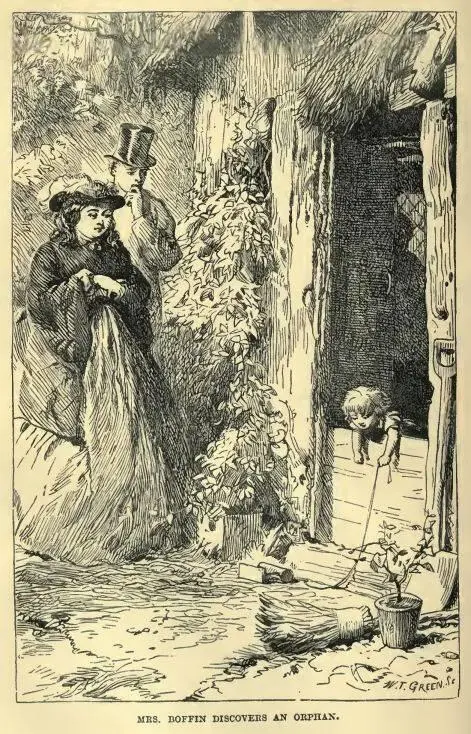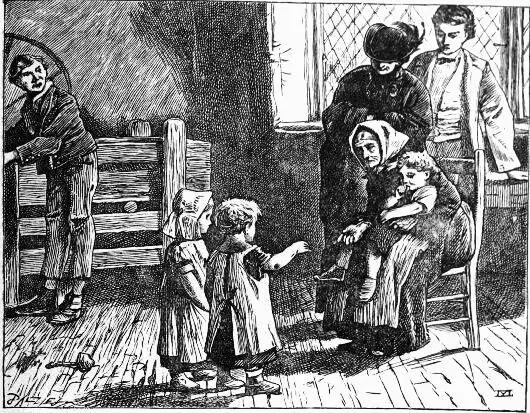It was then perceived to be a small home with a large mangle in it, at the handle of which machine stood a very long boy, with a very little head, and an open mouth of disproportionate capacity that seemed to assist his eyes in staring at the visitors. In a corner below the mangle, on a couple of stools, sat two very little children: a boy and a girl; and when the very long boy, in an interval of staring, took a turn at the mangle, it was alarming to see how it lunged itself at those two innocents, like a catapult designed for their destruction, harmlessly retiring when within an inch of their heads. The room was clean and neat. It had a brick floor, and a window of diamond panes, and a flounce hanging below the chimney-piece, and strings nailed from bottom to top outside the window on which scarlet-beans were to grow in the coming season if the Fates were propitious. However propitious they might have been in the seasons that were gone, to Betty Higden in the matter of beans, they had not been very favourable in the matter of coins; for it was easy to see that she was poor.
She was one of those old women, was Mrs Betty Higden, who by dint of an indomitable purpose and a strong constitution fight out many years, though each year has come with its new knock-down blows fresh to the fight against her, wearied by it; an active old woman, with a bright dark eye and a resolute face, yet quite a tender creature too; not a logically-reasoning woman, but God is good, and hearts may count in Heaven as high as heads.
‘Yes sure!’ said she, when the business was opened, ‘Mrs Milvey had the kindness to write to me, ma’am, and I got Sloppy to read it. It was a pretty letter. But she’s an affable lady.’
The visitors glanced at the long boy, who seemed to indicate by a broader stare of his mouth and eyes that in him Sloppy stood confessed.
‘For I aint, you must know,’ said Betty, ‘much of a hand at reading writing-hand, though I can read my Bible and most print. And I do love a newspaper. You mightn’t think it, but Sloppy is a beautiful reader of a newspaper. He do the Police in different voices.’
The visitors again considered it a point of politeness to look at Sloppy, who, looking at them, suddenly threw back his head, extended his mouth to its utmost width, and laughed loud and long. At this the two innocents, with their brains in that apparent danger, laughed, and Mrs Higden laughed, and the orphan laughed, and then the visitors laughed. Which was more cheerful than intelligible.

Then Sloppy seeming to be seized with an industrious mania or fury, turned to at the mangle, and impelled it at the heads of the innocents with such a creaking and rumbling, that Mrs Higden stopped him.
‘The gentlefolks can’t hear themselves speak, Sloppy. Bide a bit, bide a bit!’
‘Is that the dear child in your lap?’ said Mrs Boffin.
‘Yes, ma’am, this is Johnny.’
‘Johnny, too!’ cried Mrs Boffin, turning to the Secretary; ‘already Johnny! Only one of the two names left to give him! He’s a pretty boy.’
With his chin tucked down in his shy childish manner, he was looking furtively at Mrs Boffin out of his blue eyes, and reaching his fat dimpled hand up to the lips of the old woman, who was kissing it by times.
‘Yes, ma’am, he’s a pretty boy, he’s a dear darling boy, he’s the child of my own last left daughter’s daughter. But she’s gone the way of all the rest.’
‘Those are not his brother and sister?’ said Mrs Boffin.
‘Oh, dear no, ma’am. Those are Minders.’
‘Minders?’ the Secretary repeated.

‘Left to be Minded, sir. I keep a Minding-School. I can take only three, on account of the Mangle. But I love children, and Four-pence a week is Four-pence. Come here, Toddles and Poddles.’
Toddles was the pet-name of the boy; Poddles of the girl. At their little unsteady pace, they came across the floor, hand-in-hand, as if they were traversing an extremely difficult road intersected by brooks, and, when they had had their heads patted by Mrs Betty Higden, made lunges at the orphan, dramatically representing an attempt to bear him, crowing, into captivity and slavery. All the three children enjoyed this to a delightful extent, and the sympathetic Sloppy again laughed long and loud. When it was discreet to stop the play, Betty Higden said ‘Go to your seats Toddles and Poddles,’ and they returned hand-in-hand across country, seeming to find the brooks rather swollen by late rains.
‘And Master—or Mister—Sloppy?’ said the Secretary, in doubt whether he was man, boy, or what.
‘A love-child,’ returned Betty Higden, dropping her voice; ‘parents never known; found in the street. He was brought up in the—’ with a shiver of repugnance, ‘—the House.’
‘The Poor-house?’ said the Secretary.
Mrs Higden set that resolute old face of hers, and darkly nodded yes.
‘You dislike the mention of it.’
‘Dislike the mention of it?’ answered the old woman. ‘Kill me sooner than take me there. Throw this pretty child under cart-horses feet and a loaded waggon, sooner than take him there. Come to us and find us all a-dying, and set a light to us all where we lie and let us all blaze away with the house into a heap of cinders sooner than move a corpse of us there!’
A surprising spirit in this lonely woman after so many years of hard working, and hard living, my Lords and Gentlemen and Honourable Boards! What is it that we call it in our grandiose speeches? British independence, rather perverted? Is that, or something like it, the ring of the cant?
‘Do I never read in the newspapers,’ said the dame, fondling the child—‘God help me and the like of me!—how the worn-out people that do come down to that, get driven from post to pillar and pillar to post, a-purpose to tire them out! Do I never read how they are put off, put off, put off—how they are grudged, grudged, grudged, the shelter, or the doctor, or the drop of physic, or the bit of bread? Do I never read how they grow heartsick of it and give it up, after having let themselves drop so low, and how they after all die out for want of help? Then I say, I hope I can die as well as another, and I’ll die without that disgrace.’
Absolutely impossible my Lords and Gentlemen and Honourable Boards, by any stretch of legislative wisdom to set these perverse people right in their logic?
‘Johnny, my pretty,’ continued old Betty, caressing the child, and rather mourning over it than speaking to it, ‘your old Granny Betty is nigher fourscore year than threescore and ten. She never begged nor had a penny of the Union money in all her life. She paid scot and she paid lot when she had money to pay; she worked when she could, and she starved when she must. You pray that your Granny may have strength enough left her at the last (she’s strong for an old one, Johnny), to get up from her bed and run and hide herself and swown to death in a hole, sooner than fall into the hands of those Cruel Jacks we read of that dodge and drive, and worry and weary, and scorn and shame, the decent poor.’
A brilliant success, my Lords and Gentlemen and Honourable Boards to have brought it to this in the minds of the best of the poor! Under submission, might it be worth thinking of at any odd time?
The fright and abhorrence that Mrs Betty Higden smoothed out of her strong face as she ended this diversion, showed how seriously she had meant it.
Читать дальше














